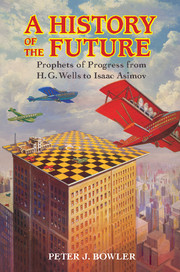Crossref Citations
This Book has been
cited by the following publications. This list is generated based on data provided by Crossref.
Bowler, Peter J.
2017.
The promise of science in early 20th-century popular literature.
Centaurus,
Vol. 59,
Issue. 3,
p.
238.
Godhe, Michael
and
Goode, Luke
2018.
Critical Future Studies - A thematic Introduction.
Culture Unbound,
Vol. 10,
Issue. 2,
p.
151.
Milburn, Colin
2019.
Ahead of Time:.
Osiris,
Vol. 34,
Issue. 1,
p.
216.
Ede, Andrew
2019.
Technology and Society.
Bowler, Peter J.
2019.
Parallel Prophecies:.
Osiris,
Vol. 34,
Issue. 1,
p.
121.
Arroyo, José Luis
2019.
Ciclos y élites: patrones recurrentes en la literatura de Asimov.
Co-herencia,
Vol. 16,
Issue. 30,
Radin, Joanna
2019.
The Speculative Present.
Osiris,
Vol. 34,
Issue. 1,
p.
297.
Morus, Iwan Rhys
2019.
Looking into the Future:.
Osiris,
Vol. 34,
Issue. 1,
p.
19.
Hulme, Mike
2020.
Climate change forever: the future of an idea.
Scottish Geographical Journal,
Vol. 136,
Issue. 1-4,
p.
118.
Holman, Brett
2020.
Aviation in the Literature and Culture of Interwar Britain.
p.
227.
Ernst, Christoph
and
Schröter, Jens
2021.
Media Futures.
p.
29.
Savransky, Martin
and
Lundy, Craig
2022.
After progress: Experiments in the revaluation of values.
The Sociological Review,
Vol. 70,
Issue. 2,
p.
217.
Stachowicz, Jerzy
2023.
„Dajcie nam cywilizację naukową” – federacja ludów Europy, Naukowa Liga Narodów i ostatnia wojna o pokój. Ritchiego Caldera i Stefana Barszczewskiego fantastyczne wizje pokoju.
Śląskie Studia Polonistyczne,
Vol. 21,
Issue. 1,
p.
1.
Kröger, Fabian
2024.
From Automated to Autonomous Driving.
Vol. 70,
Issue. ,
p.
255.
Bell, Duncan
and
Taillandier, Apolline
2024.
Cosmos-Politanism: Transhumanist Visions of Global Order from the First World War to the Digital Age.
Perspectives on Politics,
p.
1.
Falletti, Elena
2024.
Surfing reality, hype, and propaganda: an empirical comparative analysis on predictive software in criminal justice.
AI and Ethics,
Vol. 4,
Issue. 3,
p.
819.
Dunér, Ingrid
2025.
Julian Huxley, Evolutionism and the History of Transhumanism.
p.
257.
Dunér, Ingrid
2025.
Julian Huxley, Evolutionism and the History of Transhumanism.
p.
225.
Dunér, Ingrid
2025.
Julian Huxley, Evolutionism and the History of Transhumanism.
p.
289.
Dunér, Ingrid
2025.
Julian Huxley, Evolutionism and the History of Transhumanism.
p.
33.



